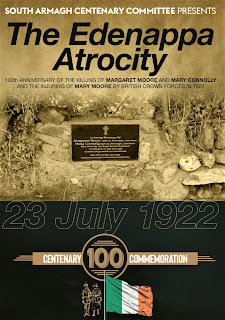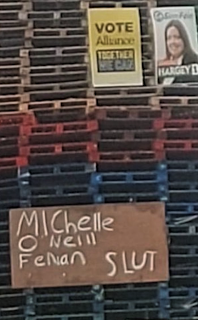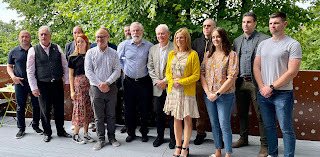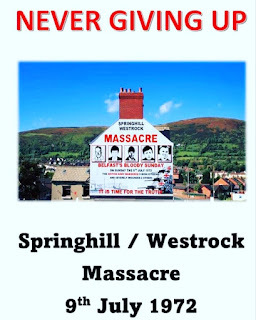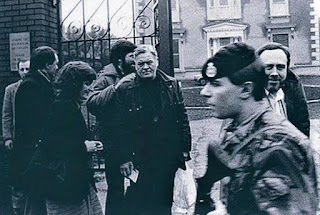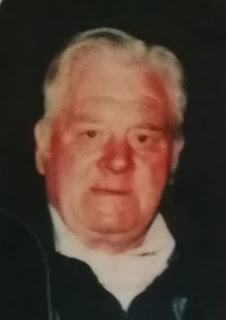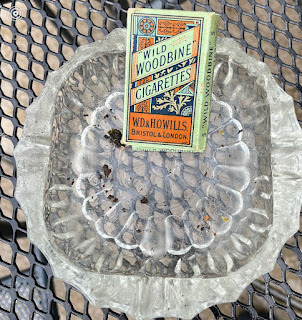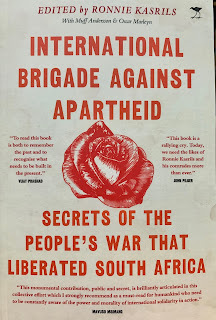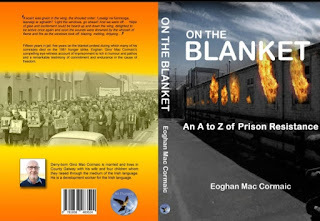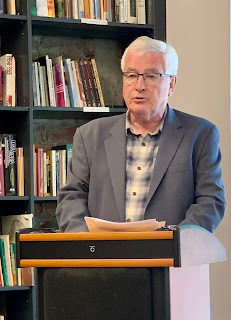Gerry Adams's Blog, page 16
August 15, 2022
A Windfall Tax urgently needed: Moore St at the Féile: Where is the International Community?
A Windfall Tax urgently needed
The cost of living crisis is taking a terrible toll on families. Food and energy bills are increasing at a phenomenal rate pushing more and more people into debt and poverty. The ready excuse trotted out by governments and most of the media to explain this dire situation is Russia’s invasion of Ukraine and the ongoing war. While this is clearly having an impact it cannot explain the monstrous profits being made by the oil and gas industry and by energy companies world-wide. The dramatic increase in fuel and energy costs have pushed up production costs, transport costs and the price paid by the consumer for food and petrol and heating. It is all interconnected.
Strip away the propaganda and the underlying cause is easily explained. Capitalism places profit over and above all other considerations. Its goal is to extract oil and gas and sell them at a price that will maximise their profit. They are feeding the fires of the climate crisis and destroying the planet and pushing millions into poverty. Corporate greed and the ability of multi-nationals to influence political parties and governments, manage media reporting and shape public opinion are all part of this equation.
Oil and gas profits for the most recent economic quarter tell their own story. Shell and Chevron each made $12bn profit. BP revealed that it had tripled its profits in the same three month period to a staggering £7bn. Exxon Mobil made $18bn in the same period. The United Nations secretary general António Guterres recently described the “grotesque greed” of the fossil fuel companies and their financial backers. In the first quarter of 2022 the largest companies will have made almost $100bn profit.
While the profits being earned this year by the oil and gas companies are greater than before, their ability to make huge profits has been around a long time. A recent analysis of oil and gas profits reveals that since 1970 fossil fuel companies have made a staggering $52 trillion in profit. In his analysis Prof Aviel Verbruggen concluded that the profits were inflated by cartels of countries artificially restricting supply. His analysis which is based on World Bank data concludes that in the last five decades the oil and gas companies have been making $2.8bn (£2.3bn) a day in pure profit.
The UN secretary general accused fuel companies and the banks that back them of having “humanity by the throat.” He compared them to the tobacco companies that continued to promote their products even when they knew of the connection between smoking and cancer. In a stinging rebuke António Guterres said: “For decades the fossil fuel industry has invested heavily in pseudoscience and public relations – with a false narrative to minimise their responsibility for climate change.”
Successive UN reports and conferences have revealed the link between fossil fuels and climate change. The threat to our planet and to millions of people from excessive heat, drought, famine, rising sea levels, wars and forced migration is happening around us every day. A recent report in the London Guardian revealed that the big fossil fuel companies, with the support of governments that claim to be leaders in protecting the climate, are planning scores of projects that will drive a coach and horses through the 1.5C increase agreed at the Paris Climate cnhage conference in 2015.
The Guardian report states: “These plans include 195 carbon bombs, gigantic oil and gas projects that would each result in at least a billion tonnes of CO2 emissions over their lifetimes, in total equivalent to about 18 years of current global CO2 emissions. About 60% of these have already started pumping.”
The reality is that first world countries like Britain, Australia, Canada, the USA and others are undermining efforts to limit global emissions of green house gases. There are political leaders who are making the calculation that the interests of the fossil fuel companies and their outrageous profits are of greater importance than the lives of working people and especially of those in third world countries that will bear the brunt of climate change and its human and societal impact.
Last week a report by the social policy unit of the University of York predicted that by next January over 70 per cent of households in the North will be living in fuel poverty. This is dramatically higher than the 18 per cent figure from four years ago. Lower wages paid to workers here compared to Britain, allied to the already high levels of disadvantage and the fact that the government price cap does not apply here, means that households in this part of the island are facing significant financial challenges in the months ahead.
The prediction by the University of York of 70 per cent of households in fuel poverty by 2023 means that over half a million households will be impacted or almost one and a half million people will be struggling to heat their homes. It is widely accepted that in some families parents are already doing without food in order to ensure that they can heat their homes and feed their children.
Bord Gáis Energy in the South last week announced that its operating profits grew by 74 per cent in the first half of 2022 from €19 million last year to €39.4 million so far this year.
Tackling this crisis internationally is not going to be easy with so many governments in hock to the fossil fuel companies. Nonetheless we must persevere. A greater emphasis on renewables and carbon-neutral energy systems is key to our future. One step that would help households in the North in the short term would be for the DUP to go back into the Executive to release the £400 million that could be used to help families. In addition a windfall tax on the fossil fuel companies, with the money raised going to help households, is also an essential element of any strategy focussed on confronting the challenge of climate change and the cost of living crisis arising from the shocking profits being made by the oil and gas companies.
While this cannot wait until we have an end to the union with Britain and self government for the people of Ireland it is self evident that London will not look after Irish interests. We need to do that ourselves. The sooner the better.
Moore St at the Féile
On Monday Honor O’Brolchain, the grandniece of Joseph Plunkett, one of the executed leaders of 1916, and Seán Ó’Muirí and Cliodhna Nic Bhranair spoke of the work of the Moore Street Preservation Trust and their efforts to protect this historic quarter.
The challenges facing these efforts are enormous. They have been made even more difficult by the attitude of the Irish government. In April 2021 An Taoiseach Micheál Martin met the developer Hammerson, who plan to demolish much of the Moore Street battlefield site. When Hammerson subsequently produced their development proposals the accompanying PR statement to the media included an endorsement by Martin.
The hard work to save this iconic street and its environs, and to prevent the destruction of buildings that are central to the story of the Easter Rising in 1916, needs the support of everyone who believes that we must protect our national heritage.
Where is the International Community?
Last Friday the government of Israel launched three days of unprovoked air strikes and artillery fire into the Gaza Strip. As a result 44 Palestinians, including 15 children, were killed and almost 400 were wounded. The images on social media of children wrapped in their white shrouds and of others injured and crying were deeply distressing. In the last 14 years Israel has waged four wars on Gaza in which 4,000 people – over 1,000 of them children – have been killed.
There is now a ceasefire. That is welcome. But there will be no peace in that region without a meaningful peace process and for as long as the Gaza Strip remains under siege and Palestinian land and water is being stolen in the occupied territories.
The international community has been shamefully silent in the face of this aggression. The difference in attitude between the totally unacceptable Russian invasion of Ukraine and the equally unacceptable Israeli Government’s apartheid system of violence against Palestinians is hypocritical.
The Irish government is on the UN Security Council. It failed in May to take a strong stand against the Israeli Government when journalist Shireen Abu Akleh was murdered by an Israeli soldier. It cannot continue its equivocation of Israeli Government actions. It is also long past time that the international community took a firm stand in support of the right of the Palestinian people to their own state.
July 31, 2022
Sweets I used to know: Britain’s legacy of shoot-to-kill
SWEETS I USED TO KNOW.
There was a Sweetie Shop across from Saint Finian’s School, just above Leeson Street on the Falls Road. It had a large advertisement for Blue Bird Toffees as part of its frontage. It was an attractive feature boasting an iconic Blue Bird in full flight. I call this fine establishment a sweetie shop because my recollection, which may be flawed, is that this shop sold only sweeties. They were there in large glass jars with big screw-on lids. Shelves upon shelves of them. Confections of all descriptions.
Penny Chews. Black Jacks. Rainbow Drops. Whoppers. Kailie Suckers. Love Hearts. Gub Stoppers. Bulls Eyes. Brandy Balls. Walkers Toffees. Sweetie Lollies. Other Toffees. Refreshers. Bubble Gum. Honey Comb. Chewing Gum. Chocolate Peanuts. Chocolate Raisins. Dolly Mixtures. Liquorice Allsorts. Spangles. Fruit Gums. Fruit Pastilles. Fudge. Chocolate Buttons. Aniseed Balls. Smarties. Lozenges. Cinnamon Drops. Malteasers. Snowballs.
The shopkeeper would take down the jar containing the sweets you requested - sometimes you could get an assortment of different ones if he wasn’t in bad form or too busy. He plunged his hand or a metal scoop into the sweets in the jar before depositing your purchase into a paper bag or a wee paper poke made of newspaper. We used to get to go there on our way to The Clonard or The Diamond Picture Houses to spend our pocket money on Saturdays. Or after school if someone had the spondoolicks.
And crisps. Every packet had its own salt inside the crisp packet, wrapped in a wee twist of blue paper. Not so many flavours as nowadays if I recall properly.
Wee glass bottles of orange juice. Ice lollies also. All kinds of flavours. Walls Ice Cream. Ice cream pokes. Wafers.
Bars of chocolate. Cadburys. Fry’s Cream. Macaroon Bars. Kit Kats. Bounty Bars. Mars Bars. Tunnocks Carmel Bars. Turkish Delights. Crunchie Bars.
Nowadays they are all smaller than they used to be. Sometimes the packaging is deceptive. Designed to make the contents look bigger than they are. Very sleekit.
Other shops sold sweets as well. Patsy’s at the corner of Abercorn Street North and Leeson Street sold cigarettes and milk and some groceries also. And buns of all kinds. Sore Heads. Flies Graveyards. Gravy Rings. Diamonds. Paris Buns. German Biscuits. Snow Balls. But not the same as the mallow filled chocolate coconut sprinkled deli-cities. These were real buns. Again much smaller these days.
Stinker Greenwoods on the Springfield Road sold sweeties and buns as well. Further up the road at the corner of Kashmir Road there was another sweetie shop. They sold broken biscuits and damaged liquorice allsorts. Bits of broken pink rock with fractured lettering in the middle. They were cheaper than the undamaged ones and me and Joe Magee would often spend our bus fare there and walk home to Ballymurphy from the Boys Confraternity in Clonard.
Victors in Castle Street sold great ice cream. A Smokie from Victor’s was a special treat at the weekend. Fusco’s too had great pokes. They still do.
On good days an ice cream man would park his big tricycle bike at the wee gate of the Falls Park. There was a huge ice box at the front of the tricycle filled with ice cream. A penny a poke. Splashed with strawberry syrup. He would scoop pokes full of his delicious fare until he ran out of ice cream. But not for long. He would go off and return with a fresh supply. Most days our pennies ran out before his ice cream.
That was before Mr Softee and other super duper creamy soft concoctions. This was real Italian icea de creama. Sometimes there were little bits of real ice in it.
During some of the riots in Ballymurphy decades later in the seventies, on warm summer days the more modern Ice Cream Van, complete with its loudly blaring jingle, would park on the edge of the rioting Ballymurphians and dispense ice cream to them until the Brits gave up and returned to their barracks at the Henry Taggart. Then the rioters and the Ice Cream van went home.
I used to wonder what the squaddies thought of it all. Most of them probably grew up in social and economic conditions not dissimilar to our own. Im sure they grew up with the same sweeties we loved, bought in Sweetie Shops just like the ones we frequented. One of the main differences was when they arrived here none of the Sweetie Shops in the communities they occupied would serve them.
So no Penny Chews. No Black Jacks. Or Rainbow Drops. No Whoppers. Kailie Suckers. Love Hearts. Not for them.
Or Gub Stoppers. Bulls Eyes. Brandy Balls. No Walkers Toffees. Or Sweetie Lollies. Other Toffees. Refreshers. Bubble Gum. Chewing Gum. No Chocolate Peanuts. Chocolate Raisins. Dolly Mixtures. Liquorice Allsorts. Spangles. Fruit Gums. Fruit Pastilles. Fudge. Chocolate Buttons. Aniseed Balls. Smarties. Lozenges. Cimmond Drops. Malteasers. Snowballs, Tunnocks Carmel Bars. No Turkish Delights. Not for them.
Not in Ballymurphy. Or other communities blighted by British military occupation.
Britain’s legacy of shoot-to-kill
Two weeks ago the BBC programme Panorama broadcast a report which claimed that the British Army’s elite death squad - the Special Air Service (SAS) was responsible for as many as 54 killings of detainees in Afghanistan in 2010-2011. The excuse in most instances was that the detained Afghan men either unexpectedly produced weapons or made an effort to take a weapon from a SAS member. Senior British Army officers covered-up these actions.
The British Military Police have now asked the BBC for all the information they had gathered. Eight years ago the Military Police established Operation Northmoor. Its role was to investigate over 600 alleged offences by British forces in Afghanistan. This included killings by the SAS of civilians. The investigation was shut down in 2019. It concluded that there was no evidence of any offences having been carried out by the British Army.
None of this will surprise the hundreds of families in the North who continue to campaign for a legacy system that will deliver truth. The use of counter-insurgency tactics, shoot-to-kill operations, summary execution, of plastic bullets and of collusion between state agencies and loyalist death squads is well recorded in the North. These have long been an integral part of the British state’s strategies in its colonial and post-colonial wars.
An earlier example of this was highlighted at the weekend when the South Armagh Centenary Committee published an account of the brutal murder of two young women in South Armagh by the British Army in 1922. The report exposes the subsequent cover-up by the Unionist Stormont regime.
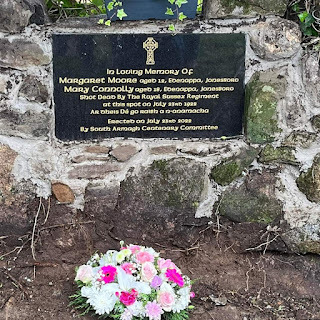 On Sunday 23rd July 1922 four young South Armagh girls, Mary (Minnie) Connolly (aged 20), Margaret Moore (aged 12), Mary Moore (aged 18) and Kate Moore (aged 15) were ambushed by British troops as they walked home. About 30 minutes before the 11pm curfew the four young women were close to their homes when British soldiers from the First Battalion of the Royal Sussex Regiment attacked them. In the fusillade of shots that were fired Margaret Moore and Minnie Connolly were shot and killed and Mary was seriously wounded.
On Sunday 23rd July 1922 four young South Armagh girls, Mary (Minnie) Connolly (aged 20), Margaret Moore (aged 12), Mary Moore (aged 18) and Kate Moore (aged 15) were ambushed by British troops as they walked home. About 30 minutes before the 11pm curfew the four young women were close to their homes when British soldiers from the First Battalion of the Royal Sussex Regiment attacked them. In the fusillade of shots that were fired Margaret Moore and Minnie Connolly were shot and killed and Mary was seriously wounded.
Two days later on 25 July a Commission was established by the Unionist Minister for Home Affairs, Dawson Bates. Like so many that were to occur in the most recent decades of conflict the process was a whitewash. The civilian and family eye witnesses were disbelieved and dismissed. The Commissioner said of the civilian witnesses’ evidence: “I cannot place a reliance upon it in face of definite evidence of the Military.”
Of the Military witnesses the Commissioner said he was “greatly impressed” by their accounts. The Edenappa Inquiry was a sham. The Stormont regime did not want the truth to be told. Nor was Edenappa an isolated incident. It is one of many such atrocities perpetrated by the British state in Ireland.
Three months ago the British government introduced legislation entitled The Northern Ireland (NI) Troubles (Legacy & Reconciliation) Bill. It will ban all investigations, inquests, and all future civil actions. This is in effect an amnesty Bill.
100 years on from the murders of Margaret Moore and Minnie Connolly and the wounding of Mary the British government is still engaged in the same techniques of cover-up and whitewash.
I love benches: Stand up against sectarianism
I love benches.
I like to spend as much time as I can outdoors. Now in case I give the wrong impression let me make it clear that I am not all the time walking or hiking. I do do that sometimes but mostly I just sit. That’s why I like benches. I have one I inherited from our old neighbour Billy McCulloch. Truth to tell I inherited only the metal ends. The wooden stays had long ago given up. Billy was a great wee man. A lover of poetry. The lads in the Mens’ Shed in Cooley fixed his bench for me. I celebrate Billy’s friendship by sitting on his bench and raising a glass to his memory. Then I read aloud a poem. One of Seamus Heaney’s or Patrick Kavanagh’s. So that bench to me will always be Wee Billy’s bench.
The late great Desi Ferguson made me a magnificent bench. Des was a mighty worker with wood as well as a great footballer and a lovely hurler. And a great friend. His bench is mighty. He made me other pieces of wooden furniture. Martin McGuinness also benefitted from Des’s generosity and his wood working skills. Des’s bench will last longer than me. It outlasted Des. And Martin. It is constructed from old hard wood and it is shaped to allow the sitter maximum comfort. The arms also are constructed to allow you to set a glass or a plate beside you. They widen out. Handy. I think of Des often but feel especially close to him when I am seated in the bench he made especially for me. Go raibh maith agat Des.
I think there should be benches in all our public spaces. In the Falls Park some benches are dedicated to local people. That’s a nice idea. There are good benches in the City Cemetery also. But only at the front. Why not at the back? And why not outside it? There are none at all in Milltown I note. Why not?
Decades ago when our community set out to reclaim our public spaces some people understandably were concerned that these revamped areas would be overrun by anti social elements. Others felt that we could not let this determine how we live. That was my view also. We needed strategies and resources to address anti social behaviour and many good people do this in multiple ways. From Féile, to numerous youth initiatives, our local schools, multiple sporting groups, a brilliant community and voluntary sector. We are blessed with good people.
And in the meantime our civic space increases from the new walk ways on the mountain, to Colin Glen, the Bog Meadows, Dam on the Springfield Road, the wonderful Dunville and Falls Parks, new Greenways, Casement and the upcoming development of that part of the district. The revamped Saint Comgall’s. The front of Coláiste Feirste. Our mountain trails would benefit greatly from a few strategically place discreet benches. Not all of us can hunker down in the heather. The views are magnificent. Imagine sitting there in comfort above it all. On a nice bench. Looking over to Scotland and Strangford. Or Lough Neagh. And the Sperrins. Or the Mournes.
It’s also great to see the many coffee shops and other wee eateries with their pavement tables and chairs being well used in this good weather. Though I note a number of shabby derelict shops in marked contrast to our new prize winning architecture. But I’m sure that these too will be sorted out in the time ahead.
In the meantime let’s dot our streetscapes with benches. A community bench is a very democratic civic essential. It encourages people to get out in the knowledge that they will have a place to sit if the notion or the need takes them. It becomes a focal point for pedestrians to take a wee rest and watch the world go by or if the mood takes them to have a yarn with other citizens. Bí do shui agus lig do scith.
For example the bottom of the Whiterock Road where it joins the Falls’ is perfect for a bench.
And up above Connolly House at The Busy Bee? Surely space for a few benches? And throughout our neighbourhoods. Little civic spaces. Wee community gardens. Community benches.
Controversy, sectarian threats and violence have long been associated with the 11 July bonfires and the marching season. ‘Kick the Pope’ bands and sectarian hate music and songs are a regular feature of many loyal order parades. This year yet again election posters of Sinn Féin, SDLP and Alliance representatives competed with each other for space on bonfires. Effigies of Mary Lou McDonald, Michelle O’Neill and Naoimi Long were hung from makeshift gallows. Sectarian, misogynistic and abusive slogans were nailed to bonfires. Among them; ‘KAT – Kill all Taigs,’ ‘All Taigs are targets’.
This year also a young man in Larne fell to his death as the bonfire builders competed with each other over who could build the biggest and the highest.
 This aspect of what unionism euphemistically describes as ‘culture’ can be traced back at least 200 years. The Orange Order was established to defend British interests and British domination in Ireland. Andrew Boyd’s seminal book – ‘Holy War in Belfast’ – and Michael Farrell’s ‘Orange State’ are among those which record the use of sectarianism by the British state and the unionist political elite to maintain their supremacy in the 19th and 20thcenturies.
This aspect of what unionism euphemistically describes as ‘culture’ can be traced back at least 200 years. The Orange Order was established to defend British interests and British domination in Ireland. Andrew Boyd’s seminal book – ‘Holy War in Belfast’ – and Michael Farrell’s ‘Orange State’ are among those which record the use of sectarianism by the British state and the unionist political elite to maintain their supremacy in the 19th and 20thcenturies.
Sectarian riots and pogroms were a familiar pattern in Belfast during this period. Effigies also played their part. Lundy or an effigy of him is burned every year in Derry as part of the Lundy’s Day parade to mark the 1688 Siege of Derry. Lundy was the governor of Derry who offered to surrender but was thwarted when the apprentice boys locked the city gates.
One of the worst examples of prolonged sectarian violence occurred in August 1864 when loyalists burned an effigy of Daniel O’Connell on the Boyne Bridge between Durham Street and Sandy Row and then attacked the Catholic Pound area in the Falls area. In the days of violence across Belfast that followed 11 died and hundreds were injured. Over 800 families were forced to flee their homes and 247 dwellings were destroyed.
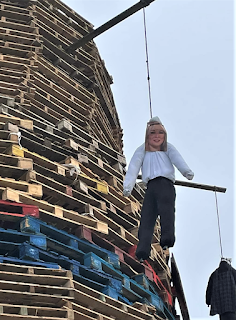 Despite the sectarianism that surrounds the July bonfires there are those in the media and within political unionism who insist it’s not threatening but part of the cultural tradition of unionism. If similar effigies and slogans against people of colour or Muslims or Jews were to appear in any other state within the European Union or in the USA or indeed in Britain they would immediately be labelled as hate crime and action taken to remove them and to hold those responsible legally accountable. Not here.
Despite the sectarianism that surrounds the July bonfires there are those in the media and within political unionism who insist it’s not threatening but part of the cultural tradition of unionism. If similar effigies and slogans against people of colour or Muslims or Jews were to appear in any other state within the European Union or in the USA or indeed in Britain they would immediately be labelled as hate crime and action taken to remove them and to hold those responsible legally accountable. Not here.
Instead we have the PSNI and prosecution service failing to stand up to this behaviour. No action taken to remove the offending material. No action taken to dismantle bonfires that carry this material. And little prospect of charges for hate crime being taken in the time ahead. I have personal experience of this. In the past I have made complaints about sectarian threats made against me. I understand the frustration that many now feel following another July bonfire period. It is unacceptable. Let the Twelfth be celebrated. The Orange tradition is part of what we are. But the unacceptable excesses around the bonfires, the sectarian chants or songs, and some of the locations and size of the bonfires cannot be tolerated.
If we are to build a better future there can be no place for sectarianism – no matter who is responsible. The Good Friday Agreement clearly states that citizens have the right to ‘freedom from sectarian harassment.’ We have to make this core principle a reality by enshrining into law an effective legal definition of sectarianism with legal sanctions and robust incitement to hatred provisions. Those who use effigies and slogans and posters as symbols of hate must know without a doubt that they will be prosecuted. And if anyone wants to build a bonfire there should be rules and regulations governing where and when and how high.
In the new Ireland there will be a place for the Orange. Marches and bonfires will be part of that. But there can be no tolerance of sectarianism and hate from wherever it comes.
July 18, 2022
Scots set date for Independence referendum; After Boris what next?; LiUNA and Terry O'Sullivan
Scots set date for independence referendum.
The Government of Scotland has moved decisively by setting the date for a referendum on sovereignty and independence. 19 October 2023 is that date. Its decision has already won support among Scottish voters. A poll published recently in the Times showed that those for and against independence are neck and neck. 48% of those surveyed were in favour of independence while 47% were against.
In June the Scottish government began publishing a series of detailed documents spelling out the advantages of ending the Union. A crucial part of this is reversing the Brexit disaster by rejoining the European Union.
On 28 June, in a coordinated series of initiatives intended to politically and legally challenge the Tory government the Scottish First Minister Nicola Sturgeon announced that she had written to Boris Johnson seeking formal consent for the referendum vote to take place. If Johnson (or his successor) refuses, she said the Scottish government would press on regardless.
On the same day Scotland's top law officer, the Lord Advocate, served papers on the Supreme Court in London seeking clarity on the legality of Scotland going ahead with a referendum. And as the First Minister spoke to the media the Scottish government published a Referendum Bill.
Scotland’s First Minister made it clear that if the Westminster government obstructs a referendum then the Scottish government would fight the next general election on a single issue platform – a de facto referendum on independence.
According to media reports An Taoiseach Micheál Martin “appeared to signal soft backing for the holding of a second Scottish Independence referendum next year.” Martin said: "Scotland sees its future economic trajectory as being one which will benefit from remaining within the European Union."
The battle lines have been drawn. The people of Scotland have the right to decide their own future. Just as we have a right under the Good Friday Agreement to a referendum on unity. Why isn’t the Irish government prepared to take the same preparatory measures that the Scottish government is?
No one, despite the frequent hysterical and inaccurate attacks claiming Sinn Fein wants the referendum immediately, believes that a referendum should be held quickly. The referendum on unity is a major constitutional initiative. It will have profound implications for all the people of Ireland and for our future. We need to prepare for it. We need to debate the possible new governmental structures required; how we will reshape and integrate governmental departments; what will the economy, education, and environmental protections look like; as well as the cultural and rights based protections essential to ensuring equality and providing human rights guarantees for all citizens.
The primary responsibility for this rests on the shoulders of the Irish government. It is a responsibility that An Taoiseach Micheál Martin is shirking.
The Scottish government is planning for the future. It is setting out the options. It is engaging in a debate. Our government is not. The desire for constitutional change in Ireland has never been stronger. The Irish government should now act positively, and convene an all-Ireland Citizens Assembly to map out a new future for the new Ireland. As in Scotland it is time to prepare for change in Ireland.
After Boris what next?
Boris Johnson has resigned. Mary Lou McDonald’s view that he will not be missed is one that is shared by many. Johnson played on peoples’ fears, as well as the supremacist and right wing attitude of many in Britain who believe the Empire was great and that Britain today is still Great.
He flip flopped on Europe eventually coming down in support of Brexit when he saw it to his personal advantage. His determination to break international law and the Withdrawal Agreement he negotiated with the EU was matched only by his willingness to drive a coach and horses through the Good Friday Agreement. His legacy legislation which has the sole purpose of protecting the British government, British Army, RUC and security personnel is disgraceful and is opposed by every party in the North.
150 years ago Lewis Carroll labelled two characters in ‘Through the Looking Glass’ as Tweedledee and Tweeledum. Essentially there was no difference between them. They looked the same. They sounded the same. Currently a whole clutch of Tweedledees and Tweeldedums are fighting over who should replace Boris Johnson as leader of the Conservative Party.
With Labour and the Tories making no real impression in Scotland the future of the Tory leadership and of the next British Prime Minister will be determined by which of the line-up of candidates can appeal best to A cohort of Little Englanders.
Whatever the outcome of the fight to replace Boris Johnson, Irish republicans understand that afterward we will still have to deal with a British government that doesn’t give a tuppenny damn about Ireland. The new Tory Prime Minister will pursue exactly the same policies in respect of Ireland that British governments have pursued for centuries.
Wolfe Tone faced the same challenge in his time. “To subvert the tyranny of our execrable government, to break the connection with England, the never-failing source of all our political evils, and to assert the independence of my country – these were my objects.”
That analysis and his objectives are as vital to the future of Ireland today as they have ever been. Tone’s remedy is our remedy. “To unite the whole people of Ireland, to abolish the memory of all past dissensions, and to substitute the common name of Irishman in place of the denominations of Protestant, Catholic and Dissenter – these were my means.”
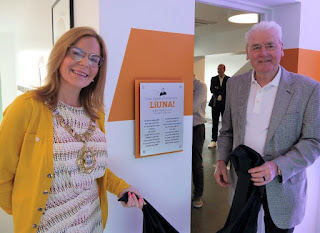
Belfast Mayor Christina Black with Terry O'Sullivan LiUNA
LiUNA and Terry O’Sullivan
Four years ago 374 Falls Road was derelict and run down. It had been a shop, a hairdressers, and a post office. Today Áras Uí Chonghaile is a hugely impressive award winning building and a must visit cultural and historical centre dedicated to conserving the heritage of James Connolly and the key role he played in Irish history, the struggle for freedom and the Labour Movement.
It was formally opened in April 2019 by President Michael D Higgins. Two months ago the Royal Society of Ulster Architects named Áras Uí Chonghaile as the Building of the Year.
The success of Aras Ui Chonghaile is down to the hard work and vision of a small group of activists in Belfast. Key among those who made the Áras possible is the Trade Union movement and especially Trade Unions in the USA.
Rita O’Hare, Sinn Féin’s representative in the USA at the time made the initial introductions and the Belfast activists found in American trade unions an enthusiasm and energy that matched their own. They quickly came on board and their funding made the Áras possible.
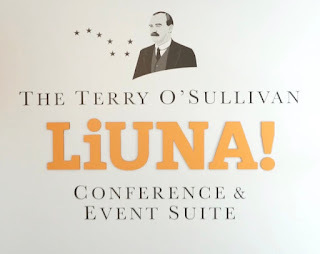 Foremost among Áras Uí Chonghaile’s American friends is Terry O’Sullivan the President of the Labourers International Union of North America (LiUNA). Terry unveiled the James Connolly statue in 2016 on the centenary of the Rising. It now stands outside the Áras.
Foremost among Áras Uí Chonghaile’s American friends is Terry O’Sullivan the President of the Labourers International Union of North America (LiUNA). Terry unveiled the James Connolly statue in 2016 on the centenary of the Rising. It now stands outside the Áras.
Last Friday Terry was back. As a thank you for his solidarity and that of LiUNA the third floor event’s room has now been rebranded as the ‘Terry O’Sullivan LiUNA Conference and Event Suite.’ Well done Terry and all our friends in LiUNA.
July 11, 2022
Do Your Job Leo!; The Springhill/Westrock families deserve truth: Looking forward to Féile an Phobail
Do Your Job Leo!
Some of our political leaders in Dublin repeatedly reduce their offices to the status of an observer. This affects many matters which fall within their responsibility. Quite often we are treated to commentary from a government Minister on public services or the lack of them, homelessness or the cost of living crisis. It is as if they had no responsibility or obligations for dealing with the issues involved.
It is easy therefore to see why many voters don’t take these representatives seriously. Why should they when those involved, particularly some Government Ministers, don’t take themselves seriously when it comes to developing and delivering the policies needed by working people and families. This says a lot about our government’s lack of ambition and their absence of strategic vision. Those involved seem more concerned to serve out their time and to keep their ministerial positions when they should be using these positions to bring about the change which is needed to shape a fairer society.
This is especially the case during these times of great challenges and greater opportunity arising from British Government policy towards Ireland. The latest offering from An Tánaiste Leo Varadkar is a good example of this. He says that ‘a border poll - at this stage - would be both divisive and defeated’.
So what is he doing about this? Zilch! You would never think to listen to An Tánaiste or An Taoiseach that their government is co-guarantor of the Good Friday Agreement. Or that the referendum on unity is a matter for him. It is little wonder that Mr Johnson treats Ireland the way he does. If the Irish Government does not stand up for its international treaty with the British Government why on earth would a serial breaker of agreements like Mr Johnson do so?
Leo Varadkar and the Irish government need to lead the debate for the new Ireland. They need to establish an all-island Citizens Assembly to plan the future. This is the time for ambitious thinking and positive strategic actions. It is the time to raise peoples’ expectations, not to lessen them. It is the time for a new approach by the Irish government. We need to utilise and intensify our diplomatic services and place the constitutional future of this island at the centre of Irelands International mission.
The government also needs to work properly with the people of the North.
If we had paid heed in the past to the excuses from Dublin for doing nothing the progress of the last fifty years would not have happened. More progress is needed. Not less. So enough of the excuses Leo. And Micheál. Do your job. Or move aside for those who will do it better than you.
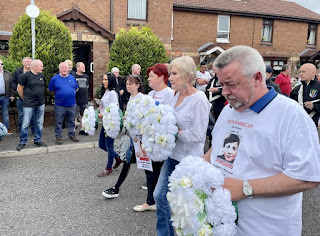
The Springhill/Westrock families deserve truth
Saturday marked 50 years from the horrific events of the summer evening of 9 July 1972 when British soldiers shot and killed two adults and three children in the Springhill/Westrock area. John Finucane MP and son of murdered human rights lawyer Pat Finucane addressed the large number of relatives and supporters who participated in the commemoration.
Those killed included 38 year old Paddy Butler who died after he was hit by the bullet that killed Fr. Noel Fitzpatrick who was trying to help the wounded and dying. 19 year old Martin Dudley was shot in the back of the head by a second British Army sniper and seriously wounded as he got out of a car. 17 year old John Dougal was shot dead and his friend Brian Pettigrew was seriously injured as they tried to assist Martin Dudley. 13 year old Margaret Gargan was shot dead by another British Army sniper. And 15 year old David McCaffrey was shot dead as he tried to pull Fr. Fitzpatrick and Paddy Butler out of the line of fire.
As in the Ballymurphy Massacre case and that of Bloody Sunday just six months earlier the British lied about the circumstances surrounding the Springhill/Westrock Massacre. They sought to present the victims as ‘gunmen’ and ‘gun women’ justifiably and legitimately killed as they attacked British troops. This lie and its perpetuation in the decades that followed caused huge distress to the families and to their neighbours, friends and community.
These British Army operations, and the long list of disputed killings, cover-ups and state collusion carried out by the RUC and British forces are of a pattern to be found in countless British military actions in former British colonies. Whether in India or Kenya, Palestine or Ireland in the early part of the 20th century those who protested for and demanded their freedom were met by violence.
The Inquiry into Bloody Sunday and the inquest into the Ballymurphy Massacre revealed the truth. Last week the inquest into the killing fifty years ago of mother of six Kathleen Thompson from Derry concluded that she was an innocent victim. On the same day the Belfast High Court ordered the scrapping in its entirety of the review by the Historical Enquiries Team's (HET) into the bombing of McGurk’s Bar in December 1971. 15 people were killed by the UVF. Brigid Irvine whose mother Kathleen was one of the victims had challenged the conclusion of the HET that there was no evidence bias by the RUC in its investigation. Justice Humphrey described the HET conclusion as ‘irrational.’
These are just a few of the many examples of killings carried out directly by or in collusion between British state forces and loyalist death squads.
In an effort to prevent further damaging revelations the British government has introduced a Legacy and Reconciliation Bill. This Bill has now passed its second reading in the British Parliament. Its aim is to close down the rights of victims by banning all investigations, inquests, and future civil actions.
Relatives for Justice said: “the so-called ‘Independent Commission for Reconciliation and Information Recovery (ICRIR)’ will hold “secret reviews and then determine what will be disclosed. It will not involve, in any way, the next-of-kin of those murdered. It is completely absent of legal norms and standards. It is, clearly, not independent, despite the title. It will hollow out the fundamental rights and freedoms enshrined in the Good Friday Agreement and thus seriously undermines and threatens the Agreement.”
All of this is a breach of previous agreements reached on legacy. It does not have the support of any of the North’s political parties or of the Irish government and the Biden administration. Support the Springhill/Westrock families in their campaign for truth.
Looking forward to Féile an Phobail
Every year I look forward to August. Since 1988 I have been amazed – entertained – uplifted and excited – by the content and the growth of Féile an Phobail. For 34 years the many people who have helped plan and organise the thousands of events that have been held have worked tirelessly to put on the best possible Peoples Festival. Well done Kevin Gamble and the Féile team. I thank and commend them all.
This year Féile an Phobail has surpassed itself. Over 300 events. Great acts like Paul Brady, Imelda May and Damian Dempsey, the Wolfe Tones and traditional acts in venues across the west of the City. World class arts and cultural events along with great debates and discussions are all part of the ten day programme beginning on the 4 August and running to the 14 August.
These will include the Moore Street Preservation Trust which will be holding a talk on the campaign to save Moore St. in Áras Uí Chonghaile on Monday 8 August. And on Friday morning 12 August during prisoners’ day in the Felons Club Richard McAuley and I will be launching our new book on The Armagh Women. It tells the story of women republican POWs held in Armagh Prison. We hope to see you there.
July 4, 2022
Bingo; The Protocol debacle; A masterclass of song and music
Bingo keeping a wary eye to passing Brits while Joe Austin, mise agus Danny Morrison were showing Ken Livingstone and Kathy Bundred the Falls Road 1983
Bingo.
My recollections last week on my successful battle against the dreaded nicotine, sparked, pardon the pun, similar recollections from some of my friends. Richard, who never smoked, reminded me of our old comrade Joe ‘Bingo’ Campbell. Bingo used to work in the old Sinn Féin office at the corner of Sevastopol Street. In those days the office was little more than a slum. It housed a number of projects including the Republican Press Centre, the POW Department, An Phoblacht/Republican News and the transport hub for buses taking prisoners’ families to visits in Long Kesh, Armagh and Portlaoise and other jails.
The building was regularly raided. The British Army would wait outside stopping people going in and out, harassing and abusing everyone. It was the target for bomb and gun attacks, including one by a death squad using an RPG rocket launcher. In one attack in 1992 three folks in the Advice Centre were killed, Pat McBride, Paddy Loughran and Michael O Dwyer. Pat Wilson and Nora Larkin were injured.
During these turbulent years Bingo did all the odd jobs about the building. He collected and posted mail, emptied the bins, went for messages, kept an eye on British Army patrols. He was a big man with a ruddy complexion. He was also a very good singer. He used to do a fine rendition of The Bonny Boy in the old Felons in Milltown.
Anyway as I mention above Bingo would do messages for the rest of us. One day during one of my efforts to stop smoking I had a horrific urge for a cigarette. At that time for no good reason I would smoke an occasional cigar instead of cigarettes. I suppose in my nuttiness I thought one cigar was better than a few cigarettes. On the day in question I had stubbornly resisted the temptation to have a smoke but eventually I could stick it no longer. I was relieved when Bingo made his way up the stairs to where I was working to tell me he was going to the shop. He asked me if I wanted anything.
‘Thanks Joe’ I said to him, giving him some money ‘would you get me a Hamlet?’
‘No bother’ Bingo told me cheerfully and away he went.
I went back to my desk to do whatever I was doing. A Hamlet by the way is a small cigar. They used to be very popular. Their advertising slogan was, ‘Happiness is a cigar called Hamlet’. Now that I had broken and given into the nicotine the desire for a Hamlet was pure torture. I paced the floor of our very small office waiting for Bingo to arrive back with my nicotine fix. Minutes slowly ticked by. No sign of Bingo. A half hour later still no Bingo. An hour slipped away as my craving for a smoke became hysterical.
Every time I heard a footstep on the stairs I thought it was Bingo. Those of you who have never smoked will probably not fully understand the agony I was going through. Having crossed the line and given in now all I could think of was the Hamlet Bingo was going to present to me when he got back. If ever he got back.
Maybe he had an accident I fretted. Maybe the Brits had stopped him. Maybe I would never get my smoke. Eventually just when I had almost given up I heard Bingo on the stairs.
‘I’m sorry for being so long,’ he guldered up to me before making his way upwards.
I stood up eagerly and expectantly to greet him. He handed me a hamburger.
‘I’ve been everywhere up and down the road’ he exclaimed, ‘I can’t get an omelette anywhere so I got you a burger instead.’
The Protocol debacle
Six years ago on 23 June 2016 the Brexit referendum was passed by a narrow majority. In England and Wales the majority voted to leave the EU. In the North and in Scotland the majority of people voted to remain in the EU. The democratic vote of the people of the North and of Scotland was ignored.
The Protocol keeps the North of Ireland in the European Single Market for goods. This has resulted in a customs border in the Irish Sea, a deepening crisis between the EU and the British government. The DUP is blocking the formation of the Executive unless everyone else concedes to their demand that the Protocol is scrapped.
Almost every day a new claim, a new accusation of blame or a new threat emerges as a result of Brexit.
Consequently, I thought it might be useful to remind us of some of the core facts around an issue which has the potential of collapsing the Good Friday Agreement.
My list is far from exhaustive or exclusive.
· In the June 2016 Brexit referendum 56% of the population of the North voted to remain in the EU.
· In 2018 Boris Johnson told a jubilant DUP conference that “no British Conservative government could or should sign up to any … agreement” requiring any sort of frontier within the UK borders.
· In October 2019 Johnson did exactly that when he negotiated the Withdrawal Agreement and Protocol with the EU.
· The Tories are for withdrawing from the European Court of Justice (ECJ) and are also committed to withdrawing from the European Convention on Human Rights.
· Several weeks ago on 13 June the Johnson government published its Protocol Bill. 15 out of 26 clauses provide Ministers with the power to make "any provision the Minister considers appropriate.”
· Effectively the British are unilaterally tearing up an international treaty they negotiated.
· The British claim that the Protocol undermines the Good Friday Agreement is bogus.
· It is the British government’s threat to withdraw from the European Convention on Human Rights that is a direct attack on the GFA.
· Data from the Office for National Statistics reveals that the Protocol has ensured that the North’s economy is outperforming Scotland, Wales and England.
· The Scottish First Minister Nicola Sturgeon recently said that “…if I could get a protocol that would allow Scotland to continue to trade freely across the single market, I’d take that in a heartbeat …”
· The majority of citizens in the North in the Assembly election voted for parties that support the Protocol.
· The majority of MLAs elected support the Protocol.
· The EU and the USA – which is a guarantor of the Good Friday Agreement – have made clear their determination to defend the Agreement.
In the midst of this deepening crisis it is important to remember that in 2017 the EU said that in the context of a united Ireland all of Ireland would automatically become a full member of the EU.
In 2007 when Ian Paisley and Martin McGuinness took up their roles as First and deputy First Minister their first joint act was to send a letter to the British Secretary of State to vacate Stormont Castle. As Ian Paisley said to Martin at the time: ‘We don’t need an Englishman to rule us’.
He was right. We have the intelligence and the wit to rule ourselves and to build a better future for all our people and we can, if the people so decide, do that within the European Union.
A masterclass of song and music
Paul McCartney’s opening song for his amazing Glastonbury set on Saturday night was ‘Can’t buy me love’. As the opening bars began to play the years rolled back for this Beatles fan and I was a teenager again listening to their latest hit on the radio. It was March 1964. I was 15. ‘From me to you’ had been their first number one the previous May. ‘She loves you’ their second. ‘I want to hold your hand’ was next and then it was ‘Can’t buy me Love’.
Paul McCartney’s two and a half hour set at Glastonbury was a masterclass in song writing and musicality. The huge audience enthusiastically sang along. Whether to Ob-La-Di, Ob-La-Da or Get Back or Lady Madonna or Let it Be or Hey Jude. The concert was a joy to watch and to sing along with at home. At least nine Beatles songs. And then there was Dave Grohl of the Foo Fighters and one of my favourite musicians Bruce Springsteen on stage rocking with McCartney and his outstanding group of musicians.
It was a remarkable evening of nostalgia and incredible music by one of the great songwriters of any generation. Wouldn’t it be great if Féile an Phobal could persuade Paul McCartney to play the Falls Park!!!
June 27, 2022
The Collectors Story: No Smoking
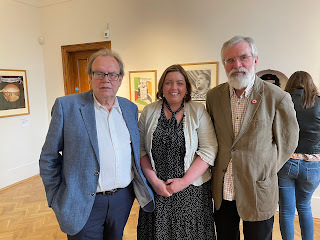 Tom with Minister Deirdre Hargey and mise
Tom with Minister Deirdre Hargey and miseThe Collectors Story
I have known Tom Hartley for 55 years. During that time he has given decades of service to the republican cause. He has been an organiser, a writer, a propagandist, a leader. During the anti-internment protests of the early 1970s, and then the H-Block/Armagh campaign he was in the front line. He was Chair of Sinn Féin in Belfast and then during the hunger strikes in 1980 and1981 he was responsible for the Sinn Féin Prisoner of War dept ensuring that we had a line of communication with the prisons.
In the 1980s Tom was Ard Runai of the party. With the development of the Sinn Fein peace strategy Tom, along with Jim Gibney, led our effort to engage with political and civic unionism and the Protestant Churches. Later Tom became a popular Belfast City Councillor and Mayor of the City
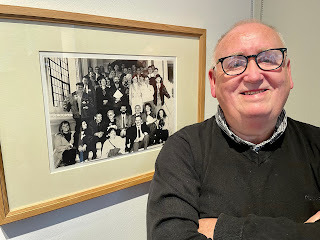 Among Tom’s many talents – a bodhrán maker and player par excellence with a fine taste for good food and fine wine – he is also an historian who has written about the people and history of Belfast through his books on the City Cemetery; Milltown Cemetery, and Balmoral Cemetery.
Among Tom’s many talents – a bodhrán maker and player par excellence with a fine taste for good food and fine wine – he is also an historian who has written about the people and history of Belfast through his books on the City Cemetery; Milltown Cemetery, and Balmoral Cemetery.
Tom decided many years ago that the republican history of the city – often ignored by the more established institutions – needed to be told and preserved. So Tom became a collector. Posters, leaflets, badges, publications, books, speeches, in fact anything that wasn’t nailed down would find its way into the Linen Hall library for the perusal and preservation of this and future generations. Mostly republican but his collection also reflects the differences of opinion and politics within our society.
In 2016 the Ulster Museum began its ‘Collecting the Troubles and Beyond’ project to which Tom has donated over 2,000 objects. Last week Tom opened his own unique collection. A Collectors Story. At the well attended event he said: “If you’re not seen – you’re not heard. When you’re not heard someone else will steal your voice, either distort or silence your narrative.”
So, take the time to go to the Ulster Museum. You won’t be disappointed. Tom has made an invaluable and innovative contribution to the story telling of Ireland. Well done chara.
No Smoking
Back in the day my generation, or most of us, used to smoke. It was the social thing to do at that time. Gallagher’s Blues, Park Drive, Woodbine were the ‘feg’ of choice. Some shops sold them as single cigarettes. Some were also available in packs of five. I came upon an empty packet of 5 Woodbine recently. It sparked memories and a regret that I ever smoked. It was Joe Magee’s fault. Joe was a neighbour and a childhood friend. Joe is my pal to this day. He lives in Australia now. He introduced me to nicotine.
Later when he joined the Merchant Navy Joe brought home duty free Capstan, Benson and Hedges, Marlboro - I think that featured a cowboy in its adverts. He also brought Peter Stuyvesant and Camel into our lives. And our lungs. Once he went very arty with Gauloise Bleu before descending to rolling his own. Rizla cigarette papers wrapped around Golden Virginia tobacco. There was even a little machine for rolling cigarettes, complete with filter tips. When Joe and I started smoking filter tip cigarettes weren’t so popular.
Trips to Dublin introduced us to Sweet Afton and Major Extra Size along with Carrolls Number 1. It seemed everyone smoked in those days. In this current smoke free era it is hard to imagine how smoggy public places could be back then. Talk of smoke filled rooms? Pubs, cafes vied with Picture Houses and Concert Halls, Committee Rooms and Changing Rooms for that title.
And our houses were the same. Most homes had ash trays. Some were rather stylish perched on their own column of brass or glass or wood. Now they are rarely to be seen except as treasures on the Antique Road Show. Nowadays smokers stand outside in doorways and little shelters, like banished children of Eve, clustered together in all types of weather having a wee drag. I am told that romance often flourishes in these close encounters.
I used to smoke everything. Everything legal that is. Cigarettes, Cheroots, Cigars. The Pipe. Sometimes all at the same time. Well not exactly all at once. My mouth isn’t as big as that, contrary to the claims of the usual jealous detractors.
Then I caught myself on. I started to try to give them up. I did it so many times I got good at it. Sometimes when I was trying to stop I used to keep a few fegs in a packet in my pocket. When the urge was on me to smoke I would take out a cigarette and talk to it.
‘Do you really think you’re gonna break me?’ I would tell it.
Some times that worked. Other times the cigarette faced me down. No matter how tough I talked it was well schooled in ant-interrogation techniques. It said nothing. I must confess, pardon the pun, that when I told the cigarette everything I knew about smoking and after I strenuously disassociated myself from and repudiated all connections with it, occasionally I broke and succumbed to the urge for one ‘last’ smoke.
It was the same in prison as it was out of prison. I struggled with my addiction. Cigarettes are like currency in prison. Especially among the Ordinary Decent Criminals, as the Brits call them. To distinguish them from the political prisoners. Tobacco used to be king in those penal circles.
Toítíní was also a highly prized commodity for us politicos. Especially in punishment regimes where they were mostly forbidden. Or very scarce. I remember one comrade smoking tea leaves wrapped in toilet roll. He only managed two drags. Others scrounged discarded cigarette butts and shredded them into rollups. Sometimes using pages from The Bible. Holy Smokes.
Colette smoked too. Though she confined herself to cigarettes. Then our oldest lad, alerted in school to the dangers of smoking, started to admonish us. So I stopped. But then I broke again. I never let on. It was a temporary lapse I told myself.
One day I was having a sneaky puff in the toilet. I neglected to lock the door. The oldest lad burst in. He caught me feg in hand. He was so let down and disappointed in me there was only one thing I could do. I stopped smoking there and then. One of the best things I ever did for my health. Go raibh maith agat Gearóid.
Colette stopped as well, some time afterwards. But better late than never. Since then we live in a smoke free zone.
Three books: International Brigade against Apartheid: Secrets of the People’s War that Liberated South Africa’ Ronnie Kasrils: On the Blanket by Eoghan MacCormaic: United Nation by Frank Connolly
Three Books
I thought it would be a good idea to dedicate an occasional column to books. We can return to Brexit, the Protocol and other such matters at another time. So in this column I am reviewing three books. United Nation by Frank Connolly. On The Blanket by Eoghan Mac Cormaic and International Brigade against Apartheid: Secrets of the People’s War that Liberated South Africa’ By Ronnie Kasrils.
These are clearly political books which may not surprise any of you. I am also conscious that these three are written by men. So less I give you the wrong impression let me make it clear that my reading activity is not limited to political books or to male authors. I binge read, so Sebastian Barry’s The Sacred Scripture, Billy Connolly’s Windswept and Interesting are also on the go along with Sylvie Simmons I’m Your Man about Leonard Cohen. I dip in and out of them when I get the chance. I also prefer real books to Kindle or other electronic models. Richard is a Kindleman. But a book is a book and for me there is no substitute. I am also always taken by a nicely presented tome. Imelda May’s A Lick And A Promise is o great example of that. And her poetry is wonderful. I whole heartedly recommend A Lick And A Promise.
International Brigade against Apartheid: Secrets of the People’s War that Liberated South Africa’ Ronnie Kasrils.
I have known Ronnie Kasrils for many years. He is a friend of Ireland and a champion of those struggling around the world for freedom and justice. In 1961 he was a founding member, along with Nelson Mandela and others, of Umkhonto we Siswe – MK for short – the armed wing of the African National Congress. In the post apartheid South Africa he was the Minister for Intelligence and Minister for Water.
Ronnie is currently in Ireland promoting his new book ‘International Brigade against Apartheid: Secrets of the People’s War that Liberated South Africa’ which provides a remarkable insight into the international solidarity that was crucial in achieving a free South Africa. Last week I had the honour and pleasure of launching the book with Ronnie at an event in Áras Uí Chonghaile.
During his long years of service to MK and the ANC Ronnie spent much of his time in exile organising those outside of South Africa who were part of the anti-apartheid campaign as well as those who assisted MK. The International Brigade Ronnie writes, “served a just cause for freedom against tyranny, and were composed of volunteers motivated by the spirit of international solidarity.”
Irish citizens were hugely supportive of the struggle against apartheid. The stand taken by the Dunnes Store workers remains a shining example of the solidarity of workers in one country for workers in another.
Irish republicans too have long had close fraternal links with the ANC and MK. Kadar Asmal who founded the Irish Anti-Apartheid Movement and was later a Minister in post Apartheid South Africa revealed in his book ‘Politics in My Blood’ that the MK attack in June 1980 on the Sasolburg oil refinery – South Africa’s most important – involved the IRA.
In the introduction to his book Ronnie refers to the concept of Ubuntu. It is a recognition that we are all connected together in our humanity. This is the essence of international solidarity. Where we see injustice either in our own place or in Palestine or South Africa we have a responsibility to help end it. Ar scath a cheile a maireann na daoine.
Ronnie’s book is a must read for anyone interested in national liberation struggle. His remarks at the Belfast launch were inspirational and insightful.
Well done Ronnie.
On the Blanket by Eoghan MacCormaic
Eoghan Mac Cormaic is one of our most willing cheerful modest and clever writers. He is part of that growing band of republicans, particularly former political prisoners, who have produced an account of their experiences. This new book by Eoghan is based on his Pluid-Scéal na mBlocanna H 1976-81. Published by Coiscéim in 2021 it tells the story of Eoghan’s life On the Blanket, mostly in H Block 5. In this English language version he takes us through the A to Z of Prison Resistance. Very clever. And funny as well. Eoghan always had a way with words. He used to produce crosswords in English and Irish for the entertainment of the other blanket men. In 1989 and 1990Sinn Féin’s POW Department published two books of Irish crosswords Eoghan compiled and years later he published another one himself. He still produces a crossword puzzle for Éire Nua, the quarterly on line United Ireland magazine.
Eoghan brings the same quirkiness with words to On The Blanket. His A - the first chapter - gives us A for Arrival, Agóid, Aire, Authorities, Administration and AGs, Aifreann, Achs. And so on through the alphabet.
But what of Z or X I wondered to myself. No problem to Eoghan. X gives us X-rays and Xenophobia. Z gives us ZZ Top a popular band of musicians of that era with long wild beards much like many of the blanket men. Zinc, part of soft metal tooth paste tubes which were used to write on the cell walls.
Eoghan describes the culture which underpinned the blanket protest, ‘ …confined by the prison but not compliant to the prison. Although locked up twenty four hours a day this community was free from and rejected prison rules. For a period of five years or so they, we, became a people apart with our own rules, our own customs. We showed no respect for the prison, its screws, its governors, its rules, or its buildings because the only respect we had in that place was for ourselves. Degraded and terrorised we prized and maintained our self respect always.’
One of the most moving letters in Eoghan’s alphabet is C for Comradeship. In a page and a half he spells out what this meant in the H Blocks and Armagh Women’s’ Prison. It should continue to guide us today as should the generosity, bravery of our hunger strikers. I was also shocked to read that a third of those who served their time on the blanket are now dead. I don’t know if this is attributable to their prison experience or a sign of the age our generation is at.
Eoghan has ensured that they will not be forgotten.
United Nation by Frank Connolly
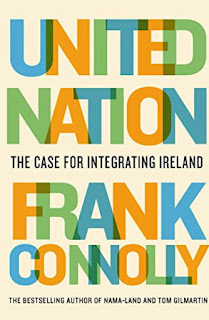
It took Frank Connolly two years to write United Nation. When he started Brexit negotiations were meandering towards a ‘no deal’. It was just before the arrival of the Covid pandemic. In this very readable book Frank has opted for a narrative style which spells out events like this as they developed instead of a more formal set up dealing with questions on the economy, agriculture, education, health, the environment, constitutional law and the other pertinent issues.
This approach works well. Frank is a very good writer and an accomplished journalist. He has published best sellers including NAMA-LAND and Tom Gilmartin. United Nation is a very accessible and compelling read and an important and timely contribution to the growing debate on the future of Ireland.
Frank also interviews scores of people. These include senior political players from all quarters and experts on various aspects of social, economic, constitutional matters. But he also has a representative sample of opinion from the arts community with singers, writers, actors and poets as well as grassroots community activists, particularly from the north.
As he said at the Belfast launch in the historic Linen Hall he also sought the contributions of those with wisdom and experience on the key areas that required research …. ‘Brendan O’Leary and Colin Harvey on the constitutional questions and future political structures, David McWilliams and Seamus McGuinness on the potential of the all island economy, Dr Gabriel Scally on health and Tony Gallagher, Jarlath Burns and Áine Hyland on education, Mike Tomlinson on social welfare, John Sweeney on the environment, agriculture, transport, Dermot Walsh on the legal system and policing, Patricia King and Orla O’Connor on the rights of workers, of women, migrants and of other cultural and ethnic minorities in a new Ireland……..’
He sought advice and knowledge on the future relationship with Britain, the role of the EU and the US and of wider global relations along with influential figures from a unionist and loyalist cultural background who were willing to discuss the question of Irish unity. He also spoke to a number of academic researchers, historians, political representatives and activists.
Frank Connolly is a longstanding and active United Irelander but this book is not about his opinion on what a new, unified Ireland would look like. Instead United Nation is based on factual and informed research and the views of a wide range of interesting people, their representative organisations and communities.
There are a number of core themes running through United Nation. They include the reality that the type of independent, inclusive, integrated and united Ireland cannot happen without radical transformation in the delivery of basic needs for all our citizens on the island. It has never been about merely joining six and twenty six counties.
Most of those interviewed are agreed, no matter about their different opinions, that the future most be planned.
I will give the last word to Frank Connolly. He says; ‘It is perhaps an irony of history that it will require a strong left wing and radical government to make such a deep and profound transformation.’
The three books reviewed here are available at An Fhuiseog,55 Falls Road, Belfast BT12 4PD; info@thelarkstore.ie: https://www.facebook.com/AnFhuiseog/
June 13, 2022
Confronting sectarianism: A wedding and a strike: I am not guilty – I want to go home, Leonard Peltier
Confronting sectarianism
The posting online of a vile video showing members of the Orange Order mocking the murder of Michaela McAreavey has been widely condemned. Last week in another video Pastor Barrie Halliday appeared on social media describing Catholics as ‘rats that need to be murdered with rifles and grenades.’
Both of these actions are evidence of an existing underlying sectarianism within northern society that has its roots in English colonialism and in the deliberate fostering by the British state in Ireland of division between Catholics and Protestants. The Loyal Orders have long played a prominent role in promulgating this.
That sectarianism still exists is not surprising. Unionist political leaders and their British allies often play the Orange Card as they seek to maximise their electoral vote or secure an advantage in a negotiation.
Since partition there are few Catholic families in the North that have not had direct experience of sectarianism, of discrimination in employment or housing, of collusion involving unionist death squads, the B Specials, the UDR, RUC and British Army or of pogroms. Orange marches with their ‘kick the Pope bands’ and sectarian songs – like The Famine Song; their posters of nationalist politicians or of religious statues on bonefires and their desire to parade triumphantly through or past nationalist areas have long been part of the nationalist experience.
The dignity and grace of Michaela‘s family is an example to us all.
Words like ‘abhorrent’ or ‘shameful’ or ‘despicable’ readily spring to mind when sectarianism rears its head. But if society is serious about challenging sectarianism there is a need to go beyond the rhetoric of condemnation. The fact is that sectarianism is written into the DNA of the northern state. The celebration/commemoration of the centenary of ‘Northern Ireland’ and the Orange Hall event which was a part of this, are a case in point. It is important to note that those involved are a bigoted minority. But they have to be stood up to.
So, what to do? The reality is that sectarianism will not be wished away. It cannot be ignored. The starting point must positive leadership from political, cultural, religious and civic society. The law and the enforcement of the law also has a crucial role to play in this. That means a new legal definition of sectarianism entrenched in law with legal sanctions and robust incitement to hatred provisions.
All cultural celebrations and expressions should be governed by the principles of respect, equality and parity of esteem. And the allocation of all public funds must be disbursed fairly and proportionately, and on the basis of mutual respect and sensitivity for the identities and aspirations of others. Bigotry and sectarianism should not be publicly funded. It should be illegal.
A wedding and a strike
James Connolly is one of my heroes. He was a socialist, a republican, a writer, a thinker, a trade union leader. He fought for the rights of workers and against their exploitation. He joined with Pearse and Clarke and Ceannt and others in the Irish Republican Brotherhood at Easter 1916 in striking for Irish freedom and for the right of the people of Ireland to independence and self-determination. He was vehemently anti-sectarian. Working in Belfast he experienced at first hand the despicable way in which sectarianism was used by unionist and business leaders to divide workers.
Áras Uí Chonghaile – on Belfast’s Falls Road - is a unique tribute to Connolly. It is an exceptional historical and educational interactive experience, containing artefacts from Connolly’s life and from the 1916 period. It is close to 1 Glenalina Terrace, which was Connolly’s home for the last five years of his life.
Last month the Royal Society of Ulster Architects named Áras Uí Chonghaile as the Building of the Year. The distinctive portrait of James Connolly on the perforated-metal gable wall also won the Integration of Art Award.
Last Saturday Frank Connolly, author, SIPTU official and one of Ireland’s leading investigative journalists, formally opened the Leabharlann Uí Chonghaile/James Connolly Library.
The library which is situated on the first floor is a welcoming space in which the visitor can sit and read some of the many books available. It contains accounts of Connolly’s life, including those by his daughters Nora Connolly O’Brien and Ina Connolly Heron, as well as works written by the man himself. It also contains books on politics in Ireland and internationally.
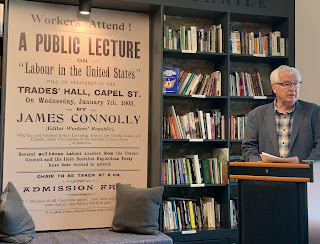 In his remarks Frank Connolly (no relation) described James Connolly as an “extraordinary socialist agitator, writer and anti-imperialist revolutionary...He was killed, not just for his role in organising the Easter Rising, as Commander in the GPO of the Irish Volunteers and members of the Irish Citizen Army, who combined during those weeks to form the Irish Republican Army. It was also because he was a threat to the capitalist class”
In his remarks Frank Connolly (no relation) described James Connolly as an “extraordinary socialist agitator, writer and anti-imperialist revolutionary...He was killed, not just for his role in organising the Easter Rising, as Commander in the GPO of the Irish Volunteers and members of the Irish Citizen Army, who combined during those weeks to form the Irish Republican Army. It was also because he was a threat to the capitalist class”
But the conversation wasn’t all serious. Frank recalled a letter sent by James Connolly to his future wife Lillie. In it he wrote: “It is such a long time since we met, but I trust we will meet to part no more. Won’t that be pleasant. By the way, if we get married next week, I shall be unable to go to Dundee as I promised as my fellow-workmen in the job are preparing to strike on the end of this month for a reduction in the hours of labour. As my brother and I are ringleaders in the matter it is necessary we should be on the ground.”
His daughter Ina remarked: “I have always thought it the hallmark of my mother’s character that she should accept the hand of a man who could mention wedding plans and a strike action in the same letter.”
Leabharlann Uí Chonghaile is now open for those who want a quiet place to read, to think, to write. Its museum experience is amazing and I would strongly encourage readers – if you haven’t called in yet – to make it a point of visiting Áras Uí Chonghaile. For information:
ÁRAS UÍ CHONGHAILE
374-376 Falls Road
Belfast, BT12 6DG
Telephone: 02890 991 005Email: info@arasuichonghaile.com
Follow us Online facebook // twitter
I am not guilty – I want to go home
This week I wrote again to Leonard Peltier, the native American rights activist who has been imprisoned for 46 years. Regular readers will know that over the years I have written about his continued wrongful imprisonment – he is America’s longest serving political prisoner.
Leonard was convicted in 1977 of the killing of 2 FBI agents at the Pine Ridge Indian reservation in South Dakota. He has always protested his innocence. Last year James H. Reynolds the former US Attorney General whose office handled the prosecution in the Leonard Peltier case appealed for Leonard’s sentence to be commuted. In recent months three Democratic Senators – Sen. Patrick Leahy and Sen. Brian Schtaz and Sen. Mazie Hirono urged President Biden to show clemency and free
Leonard. President Biden has an opportunity to do the right thing.
In an interview recently with HuffPost Leonard said: “I’m not guilty of this shooting. I’m not guilty. I would like to go home to spend what years I have left with my great-grandkids and my people.”
If you have a moment write a letter or send a card. Remember Leonard Peltier.
Leonard Peltier
#89637-132 USP Coleman
US Penitentiary PO Box 1033
Coleman,
FL, 33521
USA
June 6, 2022
The Planter and the Gael: Time for Truth: The Springhill/Westrock Massacre
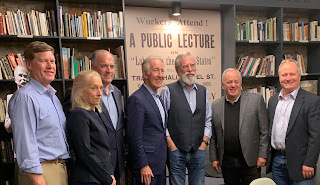
Last week US Congress member Richie Neal, Chair of the Ways and Means Committee on Capitol Hill, led a Congressional delegation from Washington to Brussels, London, Dublin, the Blasket’s, Derry and Belfast. The delegation met with a very wide range of political representatives including Government representatives as well as civic society.
The Blasket’s you ask? Why there? Well, in 1953 the last people who lived on the Blasket islands were forced to leave their beautiful islands off the coast of Kerry because of the lack of necessary services. Some of them went to Springfield in Massachusetts in the USA. That’s Richie’s district. So naturally a visit to Ireland had to include a visit to Dunquin and then a short helicopter flight to the Great Blasket. I wonder what Peig would have thought of that?
But I digress!
‘Aris,’ says you.
So, to the point of this epistle. In the course of his visit to our part of Ireland Congressman Neal spoke of the Planter and the Gael. Now way back in the day one of my Adams ancestors was almost certainly a Planter. So I have a certain connection with that term. Although I am avowedly a Gael I have no wish to ignore my roots. We all have to come from somewhere. Indeed I would love to have the time to delve into my Planter history.
Richie Neal’s comment was benign. The first time I heard the phrase the ‘Planter and the Gael’ was when Peter Robinson used it in a speech in 2004. He said: “When I speak of 'our people' I speak of those who share my unionist philosophy and those who do not – I speak of both the Planter and the Gael," he said.
He was talking at that time about his hopes of an outcome to negotiations.
He used the same term again in 2006 when a deal was put together.
"I hope that the sons and daughters of the Planter and Gael have found a way to share the land of their birth and live together in peace," he said.
I liked Peter’s remarks at that time. I still do. I saw his use of Planter and Gael as being well intended. Like Richie Neal’s comments.
I was puzzled then last week to learn that some Unionist leaders had taken umbrage at Richie. They claimed the Planter term was offensive. Maybe in a different context they might have a point. But if they didn’t take the needle at Peter Robinson why be offended by Richie Neal?
All of us who live here should know by now that this is where we all belong. This is our home. Wherever we came from this is now our native land. So we should make the most of it and make this the best place it can be, inclusive of all of us.
Poets John Hewitt and John Montague did that very well in a series of readings they conducted across the North in November 1970. The poems they read were published by the Arts Council.
They are available at:
https://wakespace.lib.wfu.edu/bitstream/handle/10339/95550/Planter_and_the_Gael.pdf?sequence=1
I recommend them. I am a fan of both John Montague and John Hewitt. In this collection both poets explore their experience of Ulster and the tradition which shaped their verses. As the Arts Council introduction says “The two bodies of work complement each other…”
Much like we should do. Unless we want to be separate. Unless we believe in division. No sensible person would want that surely? It is much better to live in harmony and equality with a benign tolerance for difference.
As Peter Robinson said: "I hope that the sons and daughters of the Planter and Gael have found a way to share the land of their birth and live together in peace,"
Let’s get on with it and make that happen.
Time for Truth
Natasha Butler’s grandfather Paddy was killed by the British Army on the evening of 9 July 1972. He was one of two adults and three children shot dead during the Springhill/Westrock massacre. The 50th anniversary of this event will take place in five weeks. This week Natasha posted a video asking the public to support a sponsored walk by the Time for Truth campaign which is being held on Saturday morning 4 June. The walk will take place on the National Trust land on the Black Mountain and Divis Mountain.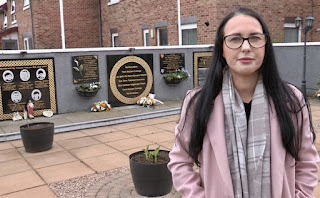 Natasha ButlerThe aim of the walk is to raise public awareness around the British government’s current efforts to pass legislation in the British Parliament that will protect British Army and RUC personnel responsible for the deaths of over 700 people. The law, which has been branded a Bill of Shame by victim’s relatives, will make it virtually impossible for victims and their families to secure truth.
Natasha ButlerThe aim of the walk is to raise public awareness around the British government’s current efforts to pass legislation in the British Parliament that will protect British Army and RUC personnel responsible for the deaths of over 700 people. The law, which has been branded a Bill of Shame by victim’s relatives, will make it virtually impossible for victims and their families to secure truth. In her video, which is available here; https://www.youtube.com/watch?v=5K1qOmb0sUU
Natasha says:
“ My name is Natasha Butler. My grandfather Paddy Butler was 38 years old when he was shot dead by the British Army here in Springhill in July 1972, along with 3 local teenagers and our parish priest. My mother was only 20 months old at the time.
For 50 years my grandmother, my mother and now myself, have fought to have the truth told about what happened during the Springhill/Westrock Massacre.
The British Government are now telling those Legacy Families who are still waiting for their Inquest dates that they have no right to the truth.
No right to justice.
To them, we are irrelevant. We are invisible.
I and the other Legacy families will never accept this.
This Saturday the 4th June the Time for Truth campaign will hold sponsored walks along Divis Mountain to raise funds to help continue our campaign for truth and justice.
I do not want my children to have to carry on this fight. We have all suffered long enough. It MUST stop here, with my generation.
I am asking you to help us keep the pressure on the British government. We need your help for this campaign.
So please, walk for Time for Truth, walk for the Legacy families or sponsor someone who will.
Stand with us as we tell the British Government that we are not invisible.
Stand with us as we tell the British Government it is not invincible.
Walk for Time For Truth this Saturday 4th June.
Thank you from us all.”
The walk was very successful. Thanks to all who participated.
The Springhill/Westrock Massacre
On a quiet summer’s evening in July 1972 British soldiers shot dead Fr. Noel Fitzpatrick as he went to administer the last rites to the dead and dying. 38 year old Paddy Butler died after he was hit by the bullet that killed Fr. Fitzpatrick. 19 year old Martin Dudley was shot in the back of the head by a second British Army sniper and seriously wounded as he got out of a car. 17 year old John Dougal was shot dead and his friend Brian Pettigrew was seriously injured as they tried to assist Martin Dudley. 13 year old Margaret Gargan was shot dead by another British Army sniper. And 15 year old David McCaffrey was shot dead as he tried to pull Fr. Fitzpatrick and Paddy Butler out of the line of fire.
The British propaganda machine immediately went into action and, as they had done the previous August in Ballymurphy and in January in Derry after Bloody Sunday, the British Army branded those they had murdered as ‘gunmen’ killed during a gun battle with the IRA.
The local community and the families knew that there had been no gun battle. They knew that no one had fired at the British Army. But in the media reports the lie was told and repeated.
The Springhill/Westrock Massacre inquest is part of the series of legacy inquests that are being held. The Springhill/Westrock families and their legal team hope it will be listed before the end of April 2023 and are pressing the Coroner’s office to list it for a preliminary hearing. However, the British government’s Bill of Shame now places a concern over this.
The Springhill/Westrock Massacre families are to be commended – like those hundreds of others in similar circumstances - for their courage and resilience in the face of British government intransigence and efforts to cover-up the violent and criminal actions of its forces.
Gerry Adams's Blog
- Gerry Adams's profile
- 29 followers


